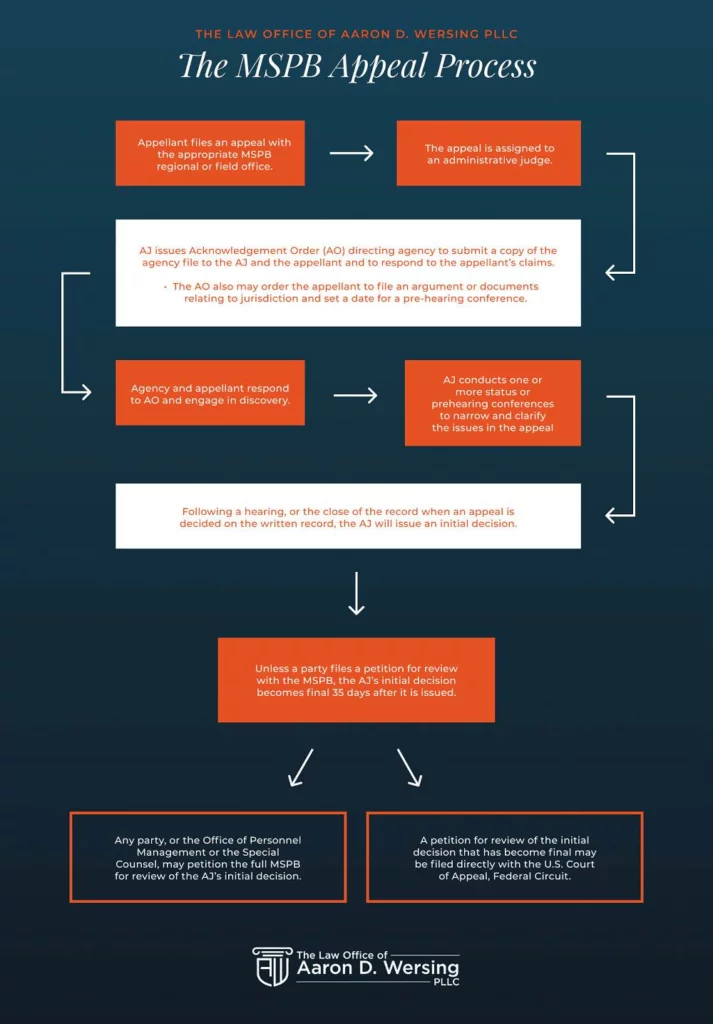
The Merit Systems Protection Board (MSPB) is the quasi-judicial agency responsible for overseeing the federal merit system.
This system establishes rules and procedures related to the hiring, firing, and promotion of federal employees.
The MSPB appeal process is an important part of federal employment because it provides a process for employees who have suffered certain kinds of adverse employment action to seek remedies.
Below is an overview of the MSPB Appeal Process, as well as a helpful infographic about the process.
The Law Office of Aaron D. Wersing focuses on helping federal employees resolve a variety of issues related to their federal employment.
If you’ve been fired, suffered from discrimination, retaliation, or otherwise faced workplace issues, we can help you file your claim with the appropriate federal agency.
Contact us online or call (833) 833-3529 today.
The MSPB Appeal Process
In general, the MSPB appeal process is very similar to what you would experience during a lawsuit.
Instead of a trial, however, the parties ultimately present their cases during a hearing before an administrative judge.
The eight major steps in the process are outlined below.
The Employee Files the MSPB Appeal
Technically, the first step in the process occurs when a federal agency makes a personnel decision that negatively affects the employee.
The MSPB most commonly hears these kinds of cases, which include suspensions of 15 days or more, terminations, and demotions.
After such an action is sustained, the federal employee may file a formal appeal with the MSPB.
Employees can file appeals online through the MSPB’s e-Appeal Online service. Generally, employees must complete this step within 30 days of the adverse action prompting the appeal.
However, there are exceptions, such as adverse actions taken by the Department of Veterans Affairs under § 714, which shorten this deadline.
This is just one of many deadlines that will come up during the process. Hiring a federal employment lawyer will ensure that you don’t miss any of these crucial deadlines.
Judge Assignment and Acknowledgement Order
Within a few days or weeks of the initial filing, the case will be assigned to an administrative law judge (ALJ).
The judge issues a document called an Acknowledgement Order. This order creates a timeline for the case and provides certain instructions about what each party must do next.
The Agency Responds to Appeal
Shortly after the ALJ issues the Acknowledgement Order, the federal agency must provide a file of their case to the judge and the employee.
This file contains the agency’s initial response along with other documents relevant to the case.
Status Conferences
After receiving the agency file, the ALJ schedules one or more status conferences.
At these conferences, the parties discuss the issues involved in the case, including any potential settlement or mediation efforts.
It is possible that an MSPB case will end here if the parties reach an agreement.
If the parties are engaging in settlement talks, the ALJ may order a case suspension. This suspension freezes the proceedings while the parties complete certain tasks.
Case suspensions usually last 30 days, and the administrative law judge has the discretion to grant a 30-day extension if necessary.
With regard to settlement, the parties may mutually agree to one of the MSPB’s mediation programs, such as the MSPB’s Mediation Appeals Program (MAP).
Once both parties upload the signed MAP election forms, the appeal is taken off the docket pending the outcome of settlement negotiations.
The Discovery Process
Just like in a trial, the parties engage in a discovery period to gather information in support of their case.
In addition to documents, audio, or video, the parties may obtain sworn testimony through depositions.
Other than the hearing, this may be the most important step in the process because it offers the employee the chance to obtain relevant evidence directly from the federal agency.
The Parties Provide Pre-Hearing Submissions and Attend Pre-Hearing Conferences
In the MSPB Appeal Process, the hearing is where the parties present their cases before the ALJ.
Before the hearing, each party will provide information about the documents and witnesses they plan to use.
This information makes up the “pre-hearing submissions.”
During the pre-conference hearing, the judge may do several things:
- Explain the MSPB appeal process to the parties;
- Facilitate discovery;
- Identify and narrow down the relevant issues;
- Obtain certain agreements between the parties (called “stipulations”);
- Discuss the possibility of settlement; and
- Rule on the admissibility and relevance of witnesses and exhibits.
During these preliminary hearings, the parties have a chance to provide support for the evidence and witnesses they wish to use.
A large part of this step involves challenging and demonstrating a basis for the chosen evidence.
The Parties Present Their Cases at a Hearing
Usually lasting one to several days, the hearing is very similar to what you’d see in a courtroom.
The parties may perform an examination and cross-examination of any witnesses, present exhibits, and other information to support their side of the appeal.
At the end, the parties may also provide closing statements, either before the judge or in writing submitted for the record.
The Administrative Law Judge Issues a Decision
After the hearing, the ALJ will review the evidence in the record and issue a final written decision.
This can take anywhere from two to six weeks, or longer, depending on the complexity of the case.
What Comes After the MSPB Appeal Process?
After the administrative judge issues a final decision, the parties have the opportunity to file another appeal if the decision is adverse to them.
This appeal is known as a Petition for Review, and must be filed within 35 days of the date of issuance of the administrative judge’s final order.
The three Board members of the MSPB review these petitions and issue a final decision. A petition for review may also be filed online.
If the MSPB’s initial or final decision is adverse to the employee, that employee gains the right to file a complaint in the Court of Appeals for the Federal Circuit.
This remedy is available only after the employee exhausts their administrative options through the MSPB appeal process.
Do I Need an Attorney to File an MSPB Appeal?
Yes, you generally should hire an attorney to assist you through the MSPB appeal process.
Although federal employees may represent themselves during an appeal, doing so is unwise in many cases.
Even though the process may seem straightforward at the outset, it can quickly become overwhelmingly complex.
For example, would you know what documents to request during discovery or what questions to ask during a deposition?
At the hearing, would you know how to provide a strong opening statement and cross-examine any witnesses?
Remember that although MSPB appeals take place in an administrative court, the process is nearly identical to a standard civil proceeding.
The success of your case depends on your ability to make and respond to complex legal arguments.
As alluded to above, there are also numerous deadlines with which you must comply.
Failing to do so can have severe consequences on your ability to obtain relief through the MSPB appeal.
Because MSPB appeals need to resolve quickly, the overall timeline for an MSPB appeal is much shorter than what you would find in a civil case.
Additionally, the federal agency responding to the appeal will be represented by an attorney, even if you are not.
These attorneys will not “go easy” on you just because you chose to represent yourself, and they will work just as hard to get a favorable decision as if they were facing another attorney, since their obligation, in either case, is to represent the agency.
Need Help Filing an Appeal with the MSPB?
The Law Office of Aaron D. Wersing has many years of experience representing federal employees in front of the MSPB.
Whether your case involves wrongful termination, suspension, or discriminatory workplace behavior, we can help.
Contact us today online or by phone at (833) 833-3529.



